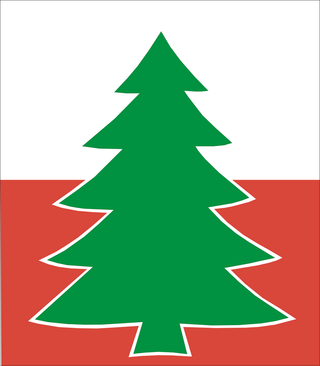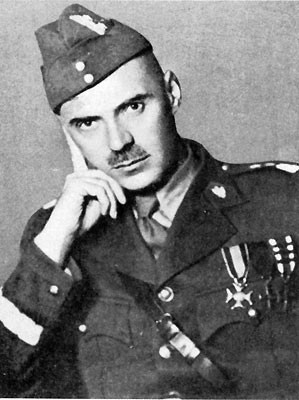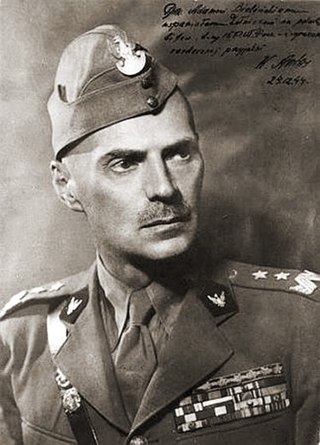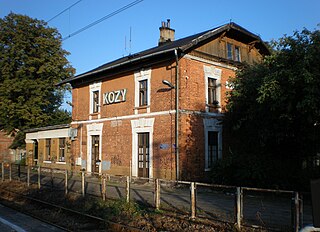Related Research Articles

In World War II, the Polish armed forces were the fourth largest Allied forces in Europe, after those of the Soviet Union, United States, and Britain. Poles made substantial contributions to the Allied effort throughout the war, fighting on land, sea, and in the air.

The 3rd Carpathian Rifle Division, also commonly known as Christmas Tree Division due to the characteristic emblem of a cedar of Lebanon superimposed upon the Polish flag, was an infantry division of the Polish Armed Forces in the West that fought during World War II on the Italian Front. It was formed in 1942 of the Polish Independent Carpathian Brigade and of forces of Lieutenant General Władysław Anders' Polish 2nd Corps evacuated from the Soviet Union.

Władysław Albert Anders was a general in the Polish Army and later in life a politician and prominent member of the Polish government-in-exile in London.

Ivor Norman Richard Davies is a British and Polish historian, known for his publications on the history of Europe, Poland and the United Kingdom. He has a special interest in Central and Eastern Europe and is UNESCO Professor at the Jagiellonian University, professor emeritus at University College London, a visiting professor at the Collège d'Europe, and an honorary fellow at St Antony's College, Oxford. He was granted Polish citizenship in 2014.

General Michał Tadeusz Tokarzewski-Karaszewicz, Coat of arms of Trąby pseudonym Doktor, Stolarski, Torwid was a Polish general, founder of the resistance movement "Polish Victory Service".

In Poland, the resistance movement during World War II was led by the Home Army. The Polish resistance is notable among others for disrupting German supply lines to the Eastern Front, and providing intelligence reports to the British intelligence agencies. It was a part of the Polish Underground State.

Kazimierz Nowak was a Polish traveler, correspondent, reporter and photographer.

Anders' Army was the informal yet common name of the Polish Armed Forces in the East in the 1941–42 period, in recognition of its commander Władysław Anders. The army was created in the Soviet Union but, in March 1942, based on an understanding between the British, Polish, and Soviets, it was evacuated from the Soviet Union and made its way through Iran to Palestine. There it passed under British command and provided the bulk of the units and troops of the Polish II Corps, which fought in the Italian Campaign. Anders' Army is notable for having been primarily composed of liberated POWs and for Wojtek, a bear who had honorary membership.

Extensa is a 2002 science fiction novel written by Jacek Dukaj, Polish science fiction writer. It is the second stand alone novels by Dukaj, and the first published by Wydawnictwo Literackie, marking the writer's growing recognition in Poland.
The Kraków Uprising was a planned but never realized uprising of the Polish Resistance against the German occupation in the city of Kraków during World War II.

Aleksander Doba was a Polish kayaker known primarily for his long voyages crossing oceans. In 2010 and again in 2013 he kayaked across the Atlantic Ocean westward under his own power. The two voyages were the longest open-water kayak voyages ever made. He was named 2015 Adventurer of the Year by National Geographic. In 2017 he completed an eastward kayaking trip across the Atlantic. He died while climbing Kilimanjaro after reaching the mountain summit.

The Army of the Duchy of Warsaw refers to the military forces of the Duchy of Warsaw. The Army was significantly based on the Polish Legions; it numbered about 30,000 and was expanded during wartime to almost 100,000. It was composed of infantry with a strong cavalry force supported by artillery. The Napoleonic customs and traditions resulted in some social tensions, but are generally credited with helpful modernization and useful reforms.

Władysław Sikorski's death controversy revolves around the death of the commander-in-chief of the Polish Army and Prime Minister of the Polish government in exile, General Władysław Sikorski, in the 1943 B-24 crash in Gibraltar. Sikorski's Liberator II crashed off Gibraltar almost immediately after takeoff, with the plane's pilot being the only survivor. The catastrophe, while officially classified as an accident, has led to several conspiracy theories that persist to this day, and often propose that the crash was an assassination, which has variously been blamed on the Soviets, the British, and the Nazis. The incident is still described by some historians as mysterious and was investigated by the Polish Institute of National Remembrance. They concluded that the injuries sustained were consistent with a plane crash and that there was not enough evidence to support or reject the theory that the plane was deliberately sabotaged.

Wrzesień żagwiący is a 1947 book of literary reportage written by the Polish historian and political journalist Melchior Wańkowicz. The book is a collection of analytical thinking stories written by Wańkowicz in the early 1940s, while the author was in exile. Following the invasion of Poland, he left the country in late September 1939 for Romania, later moving to Cyprus, BritishPalestine, Italy, and finally, to London. Wrzesień żagwiący gives a vivid account of the Polish September Campaign; its title refers to the fact that Nazi Germany, together with the Soviet Union invaded the Second Polish Republic jointly in September 1939. The book was first published in 1947, in London, by Gryf Publishing House. It was reprinted in 1990 by Polonia Publishing House, while several stories from the book were printed separately, with the most popular one, Westerplatte, having been printed in 1959, 1960, 1963, 1967, 1968, 1971, 1989, and 1990. In August 2009, Warsaw publishing house Prószyński i Spółka reprinted the book in the third volume of collected works by Wańkowicz. In this volume, Wrzesień żagwiący is published together with other war-related stories, such as Strzępy epopei, Szpital w Cichiniczach, and Po klęsce.

The National Movement is a Polish far-right ultranationalist political party. It is led by Krzysztof Bosak. It claims spiritual descendance from the prewar movement of Roman Dmowski, the National Democracy, which was also commonly called the National Movement.

Ida Victoria Nowakowska-Herndon is a Polish-American actress, dancer, television personality and television presenter. Ranked 19th in the ranking of the 100 most valuable women's personal brands according to "Forbes Women Polska"; her market value in 2022 was estimated at over PLN 90 million.

The Books of Jacob is an epic historical novel by Olga Tokarczuk, published by Wydawnictwo Literackie in October 2014. It is Tokarczuk's ninth novel and is the product of extensive historical research, taking her seven years to write.

In Polish culture, the True Pole is a stereotype of an ideal Polish person. This stereotype is closely associated with Polish Catholicism. The "true Pole" expression is often invoked in Polish right-wing and nationalist rhetoric.

The Independence March is an annual patriotic and nationalist demonstration in Warsaw held on Poland's Independence Day, November 11. Since 2011 the March has attracted annually up to 10 thousand participants. In 2020 the March was organized like a car procession. It is organized by far-right ultranationalist organisations and parties: National Radical Camp (ONR), All-Poland Youth and the National Movement.

Kozy is a train station in Kozy, Bielsko County, Silesian Voivodeship, Poland. In 2021, the station served 50-99 passengers a day. It is managed by PKP Polskie Linie Kolejowe.
References
- ↑ Tomaszewski, Irene (January 31, 2016). "Trail of Hope: The Anders Army, an Odyssey Across Three Continents". Cosmopolitan Review. Retrieved 2022-11-25.
- ↑ Dudek, Tomasz (2016). "Recenzja: Norman Davies, Szlak Nadziei. Armia Andersa. Marsz przez trzy kontynenty". Wrocławskie Studia Wschodnie (in Polish). 20: 313–315. ISSN 1429-4168.
- ↑ Władyka, Wiesław (8 December 2015). ""Recenzja książki: Norman Davies, "Szlak nadziei. Armia Andersa. Marsz przez trzy kontynenty". Polityka (in Polish).
- ↑ "Norman Davies idzie szlakiem armii Andersa. Ujawnia, jak NKWD chciała skłócić Żydów i Polaków [RECENZJA książki "Szlak nadziei"]". wiadomosci.dziennik.pl (in Polish). 2016-02-03. Retrieved 2022-11-25.
- ↑ "Redakcja » Historykon.pl". Historykon.pl (in Polish). Retrieved 2022-11-25.